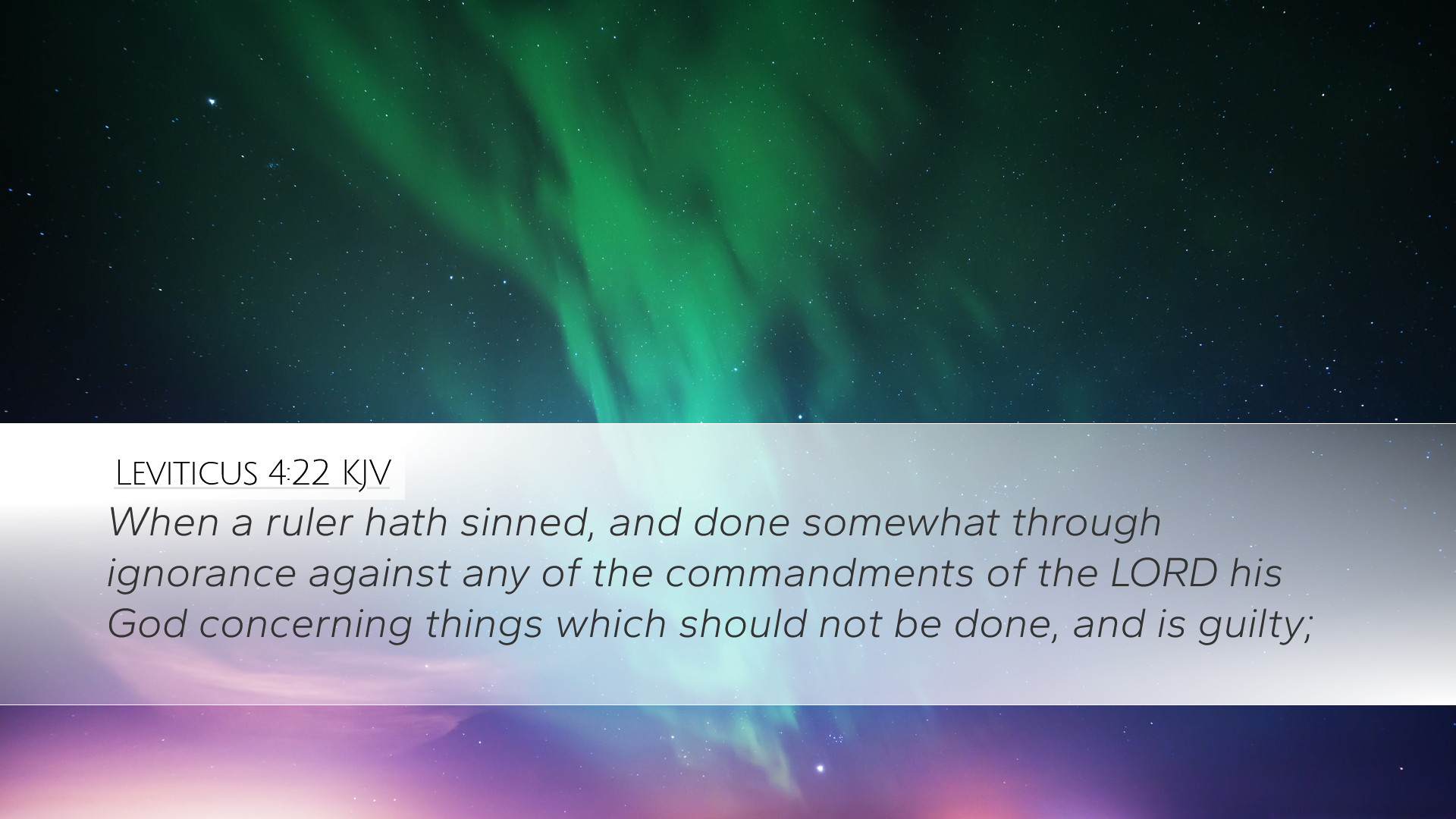Commentary on Leviticus 4:22
Introduction
The verse Leviticus 4:22 states: "When a leader has sinned and done something unintentionally against any of the commands of the LORD his God by failing to act in accordance with his word, he must bring as his offering a male goat without defect." This verse is part of the larger context of atonement offerings and reflects the seriousness with which God addresses sin, even among leaders. It is crucial for pastors, theologians, and students of Scripture to understand the implications of this verse and its broader context.
Contextual Background
This passage falls within the instructions regarding sin offerings provided in the Book of Leviticus. It specifically addresses sins committed unintentionally, underscoring the importance of intentions in the sight of God. The inclusion of leaders in this passage highlights accountability, as leaders are to set a moral example for others in the community.
The Nature of Sin and Responsibility
Matthew Henry emphasizes that even unintentional sins require atonement. He notes that leaders, who are tasked with guiding and influencing others, cannot escape their responsibility when they fail to act in accordance with God's commands. This reflects the higher standard to which they are held, as their actions carry greater implications for the people they lead.
Albert Barnes provides insight into the types of sins leaders may commit inadvertently. He points out that these could range from omissions of duty to acts that violate God's commands unknowingly. The adjective “unintentional” does not absolve guilt but rather demonstrates the need for redemption and sacrifice for restoration.
The Offering: Symbolism and Significance
The choice of a male goat without defect as an offering symbolizes purity and completeness. Adam Clarke elaborates on this, explaining that the offering represents the leader's acknowledgment of sin and the need for reconciliation with God. The choice of animal reflects the leader's status and illustrates that even the highest among the community must humble themselves before God.
- Symbol of Atonement: The sacrifice signifies the leader's desire for atonement and restoration within the covenant community.
- Public Acknowledgment: The leader’s act of bringing the offering serves as a public acknowledgment of responsibility and a model for others.
- Communal Impact: The sins of leaders can affect the entire congregation, hence their need for atonement is critical for communal holiness.
Theological Implications
Matthew Henry remarks that this passage underscores God's holiness and justice. It establishes that all sin, regardless of intent, is a transgression against God’s perfect standards. This theme carries over into the New Testament, where the concept of sin is expounded further, emphasizing the need for grace through Christ’s ultimate sacrifice.
Adam Clarke also notes that the grace of God is evident in the provision for sin offerings. The existence of such provisions shows that God is approachable and desires reconciliation with His people. Leaders, therefore, should see their failures as opportune moments to reflect on God’s mercy and grace, which they can then extend to their followers.
Practical Applications for Leaders Today
The implications of Leviticus 4:22 are profound for leaders in contemporary ministry contexts. Here are some practical applications:
- Accountability: Leaders should cultivate a culture of accountability where admitting sin, even unintentional, is met with grace and support, not shame.
- Modeling Confession: By openly acknowledging their own shortcomings, leaders can foster an atmosphere where others feel free to confess and seek restoration.
- Commitment to Holiness: Leaders must prioritize their relationship with God and strive for holiness, recognizing the influence their actions have on the community.
Conclusion
Leviticus 4:22 serves as a critical reminder of the weight of responsibility borne by leaders and the necessity of atonement for sin, whether intentional or unintentional. Through the insights of Matthew Henry, Albert Barnes, and Adam Clarke, we gain a deeper understanding of God’s standards for leaders, the significance of sacrificial offerings, and the hope of reconciliation through humility and confession. As we apply these truths within our contemporary contexts, we embrace the dual call to holiness and grace, acknowledging that in Christ, we find our ultimate atonement.


